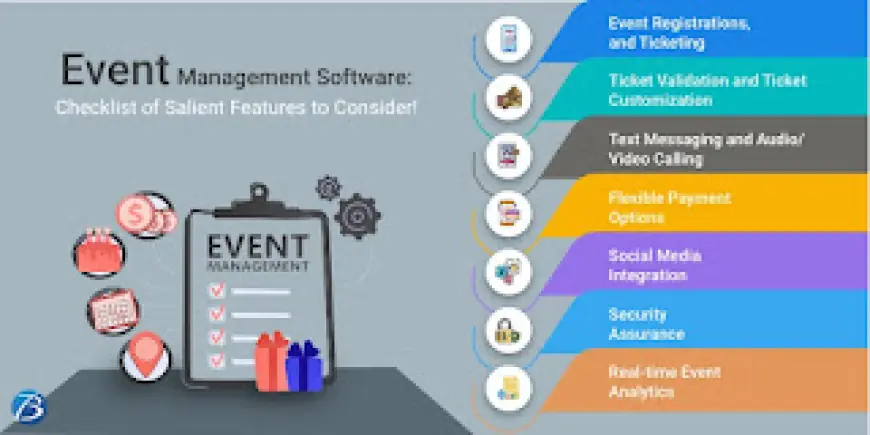How to Maximize ROI with Event Management Software

Event management can be a very daunting task considering the moving parts—beginning with venue selection, guest lists, vendor coordination, and the overall event schedule. This is where event management software comes into play. The EMS platforms are specifically designed to streamline the event planning and execution process, save you time, reduce costs, and increase the overall efficiency. How to maximize return on investment (ROI)? Let's dive in.
Streamlining Event Planning and Coordination
Event management software provides a centralized platform for managing all aspects of an event. From the initial planning stages to post-event follow-up, EMS can handle tasks like:
Budgeting and Financial Tracking: EMS helps in creating a detailed event budget with real-time spending tracking. With EMS, one can avoid over-spending and ensure that all expenses are well accounted for within the budget - the bottom line of maximizing ROI.
Guest List Management: Managing attendee registrations and invitations can be a tedious task, but EMS automates much of that work. Use these tools to track RSVPs, collect data, and manage communications, so that the guest experience is high-efficiency and low-overhead administrative efficiency.
Vendor Management: Event software can store vendor information, track contracts, and monitor payments, making it easier to stay organized. It also helps with negotiating terms and managing payments, ensuring that you get the best value for your money.
By automating these tasks, EMS frees up time and resources, allowing your team to focus on value-generating activities like enhancing attendee experience and optimizing the event’s impact.
Enhancing Communication and Collaboration
Communications are also a critical tool in event management. Since the involvement of different stakeholders will include vendors, sponsors, attendees, and even event staff, collaborative tools in an EMS platform help ensure that everyone is kept in line.
Actual-Time Updates and Notifications: Event management software enables event coordinators to make live updates to attendees, vendors, and other stakeholders, thereby minimizing the chance of misunderstandings. This ensures that all parties involved are always in touch with changes or new developments made in or about the event, making the event more efficient.
Team Collaboration Tools: These platforms usually include features like shared calendars, task management, and document sharing, which will make work easier because the team can collaborate without hassle. This would reduce chances of miscommunication issues that may result in costly delays or errors.
When your team is aligned and informed, it leads to smoother execution and, ultimately, a more successful event that yields a higher ROI.
Leveraging Data and Analytics
Powerful tools for gathering and analysing data - event management software can dramatically increase ROI, whilst the very process of collecting information about each stage of an event will most probably reveal information on attendees' behavior, interest, and preferences.
Post Event Analytics: Many EMS platforms provide post-event reporting, aiding you in reviewing the event's success. Metrics such as attendee satisfaction, engagement levels, and ROI can also be tracked to measure the effectiveness of the event, hence being in a position to fine-tune your strategy for the next event to be more successful than the previous one.
Real-time Analytics: Some systems also provide real-time analytics during the event, which helps make necessary changes to optimize performance. Whether it is marketing tactics or improving attendee engagement, that instantly gives you guidelines to help you maximize the impact of your event in real-time.
Reducing Costs with Automation
A key benefit of event management software is its ability to automate repetitive tasks, which can result in significant cost savings. This includes:
Automated Registration and Ticketing: By automating the registration and ticketing process, you can eliminate the need for manual entry and reduce the chances of human error. Plus, it speeds up the process, making it easier to track attendees and their preferences.
Marketing Automation: Many EMS platforms include marketing automation features that allow you to send personalized invitations, reminders, and follow-up emails. This reduces the time spent on manual outreach and ensures better attendee engagement.
Automation leads to fewer resources being wasted, fewer errors, and more time spent on value-creating activities, which ultimately drives up the ROI.
Improving Attendee Experience
That is, a happy attendee will probably become an attendee again, which in itself contributes directly to the event ROI. Event management software offers a range of features that can improve the attendee experience:
Personalized Attendee Experiences: Most EMS platforms are often associated with features like personalized agendas, attendee networking opportunities, and even interactive event apps. These tools will help create more engaging experiences for attendees, raising both satisfaction and the prospect of return business or attendance at future events.
Real-Time Feedback: In the event, real-time feedback can be collected from the attendees, and it can help you make immediate improvements towards higher satisfaction levels. Positive attendee experience and word-of-mouth promotion are the most important factors for improving event ROI.
Maximizing Sponsorship Opportunities
Event management software can help you identify and leverage sponsorship opportunities, creating additional revenue streams for your event. With EMS, you can:
Track sponsorship commitments: Track your sponsors' contributions, ensuring they receive the benefits they’re paying for and that the sponsorship deals are fulfilled.
Promote Sponsors Effectively: EMS platforms often provide tools to help you manage sponsor visibility during the event, such as branding opportunities, digital signage, and virtual event spaces. This increases the value you deliver to your sponsors, making them more likely to renew their support for future events.
By maximizing sponsorship opportunities, you can generate additional income that enhances the overall ROI of your event.
Conclusion
Maximizing ROI with event management software involves more than just improving efficiency—it's about leveraging the right tools to create better experiences, streamline processes, and reduce costs. You can make sure your events are bringing more value to both your organization and its attendees through automating tasks, enhancing communication, making data-based decisions, and optimizing sponsorship opportunities. In the end, you are going to get more successful events that translate directly into better ROI in event management.












